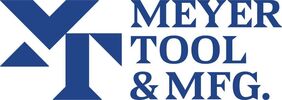Call: 708-425-9080
Toughness Testing and ASME B31.3 Process Piping Code
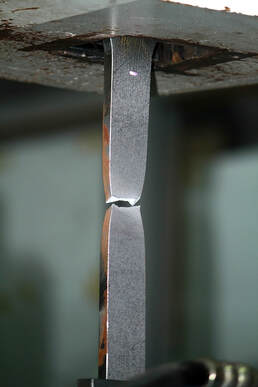 Material Testing
Material Testing
It is now common for custom cryogenic transfer lines and custom cryogenic piping components to be specified to meet the requirements of the ASME B31.3 Process Piping Code. Initially a response by Department of Energy funded entities to the requirements of the Federal Register 10 CFR 841 Appendix A Part 4, Meyer Tool has seen specification of ASME B31.3 as the code governing design, fabrication, and inspection of custom cryogenic piping systems grow beyond the National Laboratories into commercial projects.
When the pressure piping involves the transport of cryogenic fluids such as nitrogen and helium, consideration regarding ASME B31.3 code requirements for Low Temperature Toughness Tests must be considered.
Cryogenic temperatures are those defined as -150C (-238F). Cryogenic liquids are defined as those liquids that have boiling points at atmospheric pressure above this temperature limit. Common cryogenic liquids are argon (-186F), helium (-452F), hydrogen (-423F), nitrogen (-321F), oxygen (-297F), and methane (-256F).
The most common materials used in cryogenic pressure piping are austenitic stainless steel (304/304L and 316/316L) and aluminum. For the most part the application of the ASME B31.3 Toughness Test requirements of the ASME B31.3 Process Piping Code to these metals is straightforward. Only when helium or other liquids cooled below –425F are involved does the application of the B31.3 Code rules require more discussion.
When the pressure piping involves the transport of cryogenic fluids such as nitrogen and helium, consideration regarding ASME B31.3 code requirements for Low Temperature Toughness Tests must be considered.
Cryogenic temperatures are those defined as -150C (-238F). Cryogenic liquids are defined as those liquids that have boiling points at atmospheric pressure above this temperature limit. Common cryogenic liquids are argon (-186F), helium (-452F), hydrogen (-423F), nitrogen (-321F), oxygen (-297F), and methane (-256F).
The most common materials used in cryogenic pressure piping are austenitic stainless steel (304/304L and 316/316L) and aluminum. For the most part the application of the ASME B31.3 Toughness Test requirements of the ASME B31.3 Process Piping Code to these metals is straightforward. Only when helium or other liquids cooled below –425F are involved does the application of the B31.3 Code rules require more discussion.
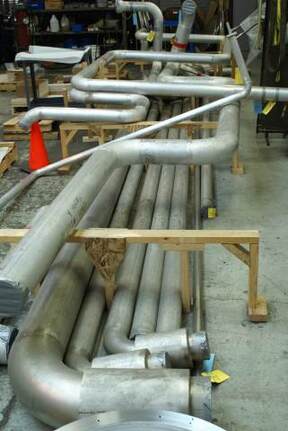 ASME B31.3 Stainless Steel to Aluminum Piping Spools
ASME B31.3 Stainless Steel to Aluminum Piping Spools
Chapter III “Materials” of ASME B31.3 addresses Toughness Test requirements of metals at lower temperature limits in paragraph 323.2.2 and Table 323.2.2. We will review how these requirements apply to austenitic stainless steels and aluminum piping at cryogenic temperatures.
Aluminum:
When deciding the ASME B31.3 Toughness Test requirements of a material we first follow the instructions of paragraph 323.2.2 (a) which directs us to review Table A-1 “Basic Allowable Stresses in Tension for Metals” for the minimum temperature allowed for use without toughness testing. In the case of aluminum this temperature is –452F. The paragraph then directs us to Table 323.2.2 and for aluminum to cell A-6 of that table. This cell states that there are no additional Toughness Test requirements for aluminum. Thus, for the aluminum materials listed in Table A-1 used at cryogenic temperatures no Toughness Tests are required for temperatures at or above –452F. Appropriate weld filler metals should also be selected per Table 323.2.2 cell A-6.
Austenitic Stainless Steel:
Repeating the above procedure, Table A-1 tells us for austenitic stainless steel (limiting ourselves to the common grades of 304/304L and 316/316L) that the minimum temperature allowed for use without toughness testing is –425F. Not bad; that covers all the common cryogenic liquids except helium. However, Table 323.2.2 has further restrictions to avoid impact tests. These restrictions are (1) carbon content less than 0.1% and (2) the material must be solution annealed. Neither of these restrictions are issues, the first limits us to the low carbon 304L and 316L grades (or dual grades), while solution annealing is required manufacturing practice for these materials when ordered to the ASTM specifications listed in Table A-1.
Aluminum:
When deciding the ASME B31.3 Toughness Test requirements of a material we first follow the instructions of paragraph 323.2.2 (a) which directs us to review Table A-1 “Basic Allowable Stresses in Tension for Metals” for the minimum temperature allowed for use without toughness testing. In the case of aluminum this temperature is –452F. The paragraph then directs us to Table 323.2.2 and for aluminum to cell A-6 of that table. This cell states that there are no additional Toughness Test requirements for aluminum. Thus, for the aluminum materials listed in Table A-1 used at cryogenic temperatures no Toughness Tests are required for temperatures at or above –452F. Appropriate weld filler metals should also be selected per Table 323.2.2 cell A-6.
Austenitic Stainless Steel:
Repeating the above procedure, Table A-1 tells us for austenitic stainless steel (limiting ourselves to the common grades of 304/304L and 316/316L) that the minimum temperature allowed for use without toughness testing is –425F. Not bad; that covers all the common cryogenic liquids except helium. However, Table 323.2.2 has further restrictions to avoid impact tests. These restrictions are (1) carbon content less than 0.1% and (2) the material must be solution annealed. Neither of these restrictions are issues, the first limits us to the low carbon 304L and 316L grades (or dual grades), while solution annealing is required manufacturing practice for these materials when ordered to the ASTM specifications listed in Table A-1.
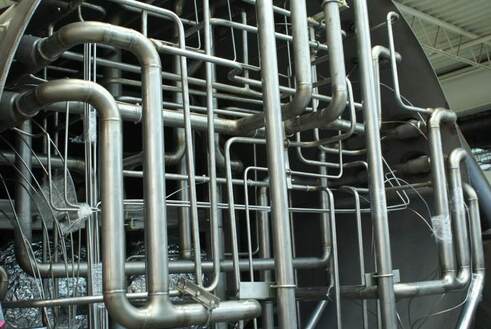 ASME B31.3 Piping Spools within a Helium Distribution Vessel
ASME B31.3 Piping Spools within a Helium Distribution Vessel
Table 323.2.2 A-4(b) has a further restriction for austenitic stainless steels. This restriction, however, is modified by paragraph 322.2.2 (f). The final determination of these combined restrictions is that the ASME B31.3 Toughness Tests are required on a production weld specimen per Table 323.3.1 at design temperatures below –150F. There is one final caveat for manufacturers, such as Meyer Tool, who have weld procedures qualified per the ASME Boiler and Pressure Vessel Code Section IX. Per Note 2 of Table 322.2.2, if the manufacturer has weld procedure qualifications in place that meet the requirements of Table 323.2.1 (i.e. procedures qualified at or below the design temperature) the requirement for a production weld specimen is waived.
To summarize, so far for austenitic stainless steels at minimum design temperatures at or above –425F. Toughness Tests are not required if:
To summarize, so far for austenitic stainless steels at minimum design temperatures at or above –425F. Toughness Tests are not required if:
- Low carbon grade materials (304L or 316L commonly) purchased to an ASTM material specification that specify solution annealing are used.
- The manufacturer has in place weld procedure qualifications at or below the design temperature.
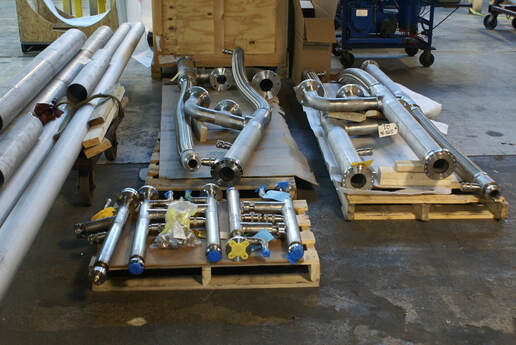 ASME B31.3 Cryogen Piping Spools
ASME B31.3 Cryogen Piping Spools
What about below –425F?
According to ASME B31.3 paragraph 323.2.2 we may use austenitic stainless steels below –425F if we follow the requirements of Table 323.2.2 Column B cell B-4. Unfortunately, the requirement of cell B-4 (after the reading of several notes and other paragraphs in Chapter III) requires us to impact test at the minimum design temperature. For liquid helium piping this would mean toughness tests performed at –452F, essentially impossible.
However, ASME B31.3 does give us some guidance on how to proceed. In Chapter I “Scope and Definitions” there are several paragraphs giving us direction. These paragraphs are included in Section 300 (b) “Responsibilities” and 300 (c) “Intent of the Code”. A reading of these paragraphs, in our opinion, gives the owner, designer and manufacturer some latitude in this situation, where the B31.3 Code doesn’t prohibit the use of these materials, but the testing requirements are not physically possible to perform. In these situations, we have recommended to the owner that good engineering practice would be to apply the requirements of a more restrictive Code, namely the ASME Boiler and Pressure Vessel Code Section VIII Division I to this situation. Part UHA “Requirements for Pressure Vessels Constructed of High Alloy Steel”, specifically paragraph UHA-51, addresses Impact Tests (e.g., Toughness Tests).
According to ASME B31.3 paragraph 323.2.2 we may use austenitic stainless steels below –425F if we follow the requirements of Table 323.2.2 Column B cell B-4. Unfortunately, the requirement of cell B-4 (after the reading of several notes and other paragraphs in Chapter III) requires us to impact test at the minimum design temperature. For liquid helium piping this would mean toughness tests performed at –452F, essentially impossible.
However, ASME B31.3 does give us some guidance on how to proceed. In Chapter I “Scope and Definitions” there are several paragraphs giving us direction. These paragraphs are included in Section 300 (b) “Responsibilities” and 300 (c) “Intent of the Code”. A reading of these paragraphs, in our opinion, gives the owner, designer and manufacturer some latitude in this situation, where the B31.3 Code doesn’t prohibit the use of these materials, but the testing requirements are not physically possible to perform. In these situations, we have recommended to the owner that good engineering practice would be to apply the requirements of a more restrictive Code, namely the ASME Boiler and Pressure Vessel Code Section VIII Division I to this situation. Part UHA “Requirements for Pressure Vessels Constructed of High Alloy Steel”, specifically paragraph UHA-51, addresses Impact Tests (e.g., Toughness Tests).
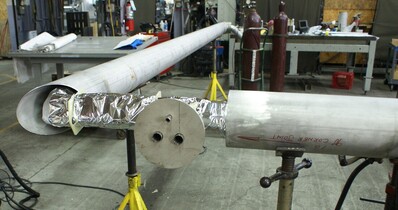 ASME B31.3 Cryogen Transfer Line, Interior View before Clam-shelling
ASME B31.3 Cryogen Transfer Line, Interior View before Clam-shelling
The rules for austenitic stainless steels in this situation are summarized below.
Meyer Tool’s recommendation to the owner in this situation is to:
Understanding the how ASME B31.3 Toughness Test requirements apply to the ASME B31.3 Process Piping Code is a part or Meyer Tool’s Reduce Project Risk Process. Whether you’re building a single prototype custom cryogenic process line or need production manufacturing support for your unique components, Meyer Tool’s engineering and manufacturing team approaches each challenge using our Reduce Project Risk Process to support your needs.
Working on a project that requires custom cryogenic expertise?
Give us a call at 708-425-9080 or fill out our RFQ form to get started!
- For MDMT below –320F (-196C) impact tests are REQUIRED of all raw material, weld procedure qualifications for both the weld and heat affected zone for each type of weld process, and production weld test specimens (weld and heat affected zone) for each type of weld process.
- Impact tests may be Charpy Tests performed at –320F (–196C) when either Type 316L (measured ferrite number not to exceed 10) or 308L ( ferrite number between 4 and 14) weld filler metals are used. THESE TESTS ARE PERFORMED AT –320F REGARDLESS OF THE ACTUAL LOWER DESIGN TEMPERATURE. Otherwise, testing using ASTM E 1820 JIC method at the minimum design metal temperature must be used.
- UHA-51(g) exempts the impact test requirements above due to low stress. Where vessels that have a coincident ratio of design stress in tension to allowable stress of less than 0.35, impact test of materials and weld procedures and production welds is NOT required.
Meyer Tool’s recommendation to the owner in this situation is to:
- Write an engineering note justifying the use of the ASME B&PV Code requirements.
- Utilize 316L or 308L weld filler metal meeting the acceptance criteria for Ferrite Number.
- Charpy Impact test base metal and production weld samples at –320F.
- Unless the ratio of allowable to design stress is less than 0.35, in which case Impact Test (Toughness Test) is not required.
- The Owner must review and accept the validity of this approach for the application.
Understanding the how ASME B31.3 Toughness Test requirements apply to the ASME B31.3 Process Piping Code is a part or Meyer Tool’s Reduce Project Risk Process. Whether you’re building a single prototype custom cryogenic process line or need production manufacturing support for your unique components, Meyer Tool’s engineering and manufacturing team approaches each challenge using our Reduce Project Risk Process to support your needs.
Working on a project that requires custom cryogenic expertise?
Give us a call at 708-425-9080 or fill out our RFQ form to get started!
